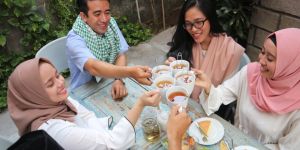
Even though Malaysia has lifted its border restrictions, foreign nationals are still advised to avoid non-essential travel. If you're still looking to move there after the COVID-19 crisis, here's an insight into what's changing regarding entry and visa requirements, employment, real estate, lifestyle, etc.
What are the current regulations for entering Malaysia?
As of July 24, 2020, all foreign nationals entering Malaysia are required to comply with a series of requirements, including a COVID-19 test and quarantine period. First, they must obtain a letter of authorisation, or entry permit, issued by an accredited Malaysian diplomatic mission. This letter must be presented to their air carrier prior to their departure. Otherwise, they will not be allowed to travel. Please note that the screening test is not essential before departure, but it is mandatory upon arrival in Malaysia. They also have to sign a Letter of Undertaking and Indemnity (LoU) which they have to email to the Malaysian embassy or consulate in their country of origin. All travellers to Malaysia are quarantined for 14 days in an establishment designated by the Malaysian Ministry of Health. However, quarantine fees are their responsibility. They are also required to download the MySejahtera app for contact tracing and wear the wristband they will be given for control.
Have there been any visa changes recently?
Expats who were stranded abroad during the COVID-19 crisis, and their dependents, are allowed to return to Malaysia since June 10, under certain conditions. Holders of valid passes should apply for an entry permit to the Director-General of Immigration Malaysia at pbf@imi.gov.my. The request must be accompanied by a letter issued by an accredited agency or a recognised body such as the Malaysian Investment Development Authority or the Expatriate Services Division (ESD). Regarding new visa applications, companies can now request Employment Pass, Professional Visit Pass and Dependent Pass on behalf of their foreign workers. The application is generally processed within 7 working days. Upon approval, the Expatriate Services Division will issue a letter of authorisation to the company and to approved bodies or agencies such as the National Disaster Management Agency Malaysia (NADMA), the National Security Council Malaysia, and the Malaysian diplomatic representation in the applicant's home country. Foreign nationals who are not exempt from visa requirements should apply to the Malaysian Embassy or Consulate in their home country.
Is it easy to find work in Malaysia following the crisis?
The COVID-19 crisis came as a blow to the Malaysian labour market. Nearly 2 million people are expected to lose their jobs by the end of 2020. On the other hand, many employees are currently facing a 30% wage cut since the start of the crisis, according to a survey by Jobstreet. Today, more than half of the respondents who have lost their jobs are actively job-hunting. According to estimates from the Malaysian Institute of Economic Research (MIER), Malaysia's unemployment rate could rise to 9.2% in the coming months. However, the International Monetary Fund (IMF), expects a recovery, resulting in an economic growth rate of 5.8%, by 2021. Accommodation, services, wholesale and retail, as well as real estate, food and agriculture are the most affected sectors in Malaysia. But it's worth noting that despite the uncertainty, several sectors, such as information and communication technology, banking and financial services, health, commerce and sales, manufacturing and production, are still recruiting.
How has the local healthcare system performed during the crisis?
Compared to other Asian countries, Malaysia's healthcare system has performed fairly well during the crisis -- which allowed it to lift its travel restrictions. Despite the number of positive COVID-19 cases across the country, Malaysia was well prepared since December 2019 thanks to the implementation of a diagnosis and treatment strategy, along with a vast communication and awareness campaign. Many hospitals have been renovated and refurbished to meet demand. Also, the capacity of some hospitals has been increased. More than 40 hospitals have been designated for the treatment of COVID-19 cases, while more than 100 have been dedicated to screening. The number of ventilators also increased from 526 to 1,034. Besides, screening tests are available free of charge -- which makes it possible for some 20,000 tests to be carried out daily since April. On the other hand, telemedicine became increasingly popular in Malaysia during the pandemic, as in many other countries. Medical consultations, appointment bookings, and prescriptions are being done either online or by phone to limit the risk of infection.
Has anything changed regarding universities and schools?
All schools in Malaysia, including kindergartens and nurseries, have reopened in line with recommendations issued by the Ministry of Health. Students at different levels are also being allowed to sit for their exams. At schools, temperature checks are being conducted at the entrance, and social distancing is being observed. Sports and outdoor activities, as well as face-to-face extra-curricular activities, are prohibited until further notice. Regarding higher studies in Malaysia, the new academic year take place in October 2020. Thus, international students looking to study in Malaysia can enrol, book their flight and travel to Malaysia. However, that only international students with negative COVID-19 results from a test carried out within 3 days prior to their arrival in Malaysia will be allowed entry. According to the Ministry of Education, the different higher education institutions are free to choose their teaching methods according to the needs of their students and their programs. Thus, distance learning remains an option for those who are not able to travel. With social distancing regulations in place, student activities will be limited to 250 participants.
How is the real estate market following the crisis?
The COVID-19 crisis had a significant impact on the Malaysian real estate market, especially since the Movement Control Order (MCO) was introduced. This resulted in a significant drop in real estate transactions and investments. However, the demand for real estate properties is quite stable. In cities like Kuala Lumpur, Selangor, Malacca, Penang and Johor, the demand for property rose between April and May 2020, according to a survey carried out in Malaysia by PropertyGuru. In the second quarter of 2020, the demand for houses with terraces led to a price rise of around 6.5%. However, the property offer in Malaysia remains higher than the demand, taking into account wage cuts and the rising unemployment rate. Therefore, it's hard to determine the long-term impact of the crisis on the property market. It's worth noting that the government recently reintroduced the homeownership campaign that includes stamp duty exemptions, the cancellation of the cash margin limit for a third home loan worth 600,000 Malaysian ringgits, as well as exemption from the capital gains tax, in order to boost property sales in Malaysia.
Has the cost of living in Malaysia changed because of the crisis?
Thanks to its affordable cost of living, Malaysia is a top expat destination. For example, life in Kuala Lumpur is 58.09% cheaper compared to New York. With the capital being one of the world's most affordable cities, some 70,921.12 Malaysian ringgits per month are good enough. Despite speculation, the COVID-19 crisis did not have much of an impact on the cost of living in Malaysia, which is good news for foreigners who are looking to relocate there after the crisis.
How about lifestyle? Have there been major changes in habits following the sanitary crisis?
As mentioned above, social distancing is the new norm in Malaysia, whether in schools, at work or in public transport. Wearing a mask has also become part of the daily life of the population, as has regular hand sanitising. People are going out less and avoid shaking hands. In a country where festivals and events are abundant throughout the year, social life has almost come to a standstill. Celebrations are not likely to be the same in the coming months. Indeed, family gatherings are currently limited to 20 people. Pubs and nightclubs also remain closed until further notice.
We do our best to provide accurate and up to date information. However, if you have noticed any inaccuracies in this article, please let us know in the comments section below.








